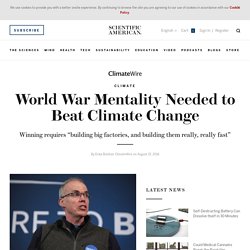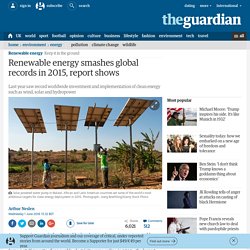

StumbleUpon. Exponential Organizations. O que são Organizações Exponenciais e qual seu impacto na economia? Minha leitura atual é o excelente livro “Exponential Organizations”, de Salim Ismail e Yuri van Geest.

O que são Organizações Exponenciais e qual seu impacto na economia? 1-2 Punch for the Amazon Rainforest. O Brasil pode enfrentar a crise econômica sem devastar a natureza. The Point of No Return: Climate Change Nightmares Are Already Here - Rolling Stone. Historians may look to 2015 as the year when shit really started hitting the fan. Some snapshots: In just the past few months, record-setting heat waves in Pakistan and India each killed more than 1,000 people. In Washington state's Olympic National Park, the rainforest caught fire for the first time in living memory. London reached 98 degrees Fahrenheit during the hottest July day ever recorded in the U.K.; The Guardian briefly had to pause its live blog of the heat wave because its computer servers overheated. In California, suffering from its worst drought in a millennium, a 50-acre brush fire swelled seventyfold in a matter of hours, jumping across the I-15 freeway during rush-hour traffic.
We Need to Literally Declare War on Climate Change. This is, simply put, as wrong as Chamberlain’s “peace in our time.”

Even if every nation in the world complies with the Paris Agreement, the world will heat up by as much as 3.5 degrees Celsius by 2100—not the 1.5 to 2 degrees promised in the pact’s preamble. And it may be too late already to meet that stated target: We actually flirted with that 1.5 degree line at the height of the El Niño warming in February, a mere 60 days after the world’s governments solemnly pledged their best efforts to slow global warming. War on Warming. World War Mentality Needed to Beat Climate Change. America’s next president must declare war on climate change in the same way President Franklin Roosevelt fought the Axis powers during World War II, climate activist Bill McKibben said in an article published today in The New Republic.

[Vídeo] – Bruno Latour – “Algo está vindo sobre nós e não estamos fazendo nada”. Bruno Latour (1947) é um filósofo da ciência francês.
![[Vídeo] – Bruno Latour – “Algo está vindo sobre nós e não estamos fazendo nada”.](http://cdn.pearltrees.com/s/pic/th/estamos-fazendo-filosofia-135418085)
É há anos professor visitante da London School of Economics e da Universidade Harvard. Doutor em filosofia e professor do Institut d’Etudes Politiques de Paris (Sciences Po). Foi professor da École nationale supérieure des mines de Paris (Mines ParisTech) e da Universidade da Califórnia em San Diego. Em setembro de 2007, Bruno Latour tornou-se diretor científico e vice-diretor da Sciences Po. We Can Stop Searching For The Clean Energy Miracle. It's Already Here. Key climate solutions have been advancing considerably faster than anyone expected just a few years ago thanks to aggressive market-based deployment efforts around the globe.

These solutions include such core enabling technologies for a low-carbon world as solar, wind, efficiency, electric cars, and battery storage. That’s a key reason almost everything you know about climate change solutions is probably outdated. In Part 1 of this series, I discussed other reasons. For instance, climate science and climate politics have moved unexpectedly quickly toward a broad understanding that we need to keep total human-caused global warming as far as possible below 2°C (3.6°F) — and ideally to no more than 1.5°C.
China is hitting its climate targets years ahead of schedule. China’s 13th five-year plan is quite possibly the most important document in the world in setting the pace of acting on climate change.

With the first draft of the energy sector plan likely released in June, and the overarching strategy intriguingly promising to ‘enhance’ its climate contributions, the stakes are high. However, the kind of climate action once expected to be laid out in the plan is actually already taking place in the real world. Clean energy deployment is exceeding targets. The structure of the economy is changing rapidly, with services and private consumption – sectors with very low energy intensity in relative terms – growing while the heavy industry sectors responsible for most of the coal consumption and CO2 emissions are contracting.
Renewable energy smashes global records in 2015, report shows. An upsurge in new wind, solar and hydro plants and capacity saw renewable energy smash global records last year, according to a report on new supply.

Some 147 Gigawatts of renewable electricity came online in 2015 - the largest annual increase ever and as much as Africa’s entire power generating capacity. Clean energy investment increased to $286bn (£198bn), with solar energy accounting for 56% of the total and wind power for 38%. Overall, more than twice as much money was spent on renewables than on coal and gas-fired power generation ($130bn in 2015), the REN21 global status report found. Christine Lins, REN21’s chief, said: “What is truly remarkable about these results is that they were achieved at a time when fossil fuel prices were at historic lows, and renewables remained at a significant disadvantage in terms of government subsidies.
For every dollar spent boosting renewables, nearly four dollars were spent to maintain our dependence on fossil fuels.” Os números da revolução das energias renováveis no mundo. Recuperar as florestas do Brasil custaria R$ 52 bilhões em 14 anos - ÉPOCA. From floods to forest fires: a warming planet – in pictures. This viral climate GIF offers an incredibly clear view of rising temperatures. This is one of the clearest visualizations of global warming I've ever seen.

Ed Hawkins, a climate scientist at the University of Reading, recently made this mesmerizing (and now-viral) GIF showing world temperatures spiraling upward over time between 1850 and 2016: (Ed Hawkins) Each point on the spiral shows how a given month's average temperature deviates from the long-term average between 1850 and 1900 (the period before industrial activity really took off in the 20th century). Global warming isn't a smooth process, and there are fluctuations from year to year due to internal variability (e.g., changes in the sun's intensity, volcanic eruptions, or shifts in the amount of heat stored in deeper layers of the ocean). But as we keep adding greenhouse gases to the atmosphere and keep trapping extra heat on Earth, that effect eventually dominates, pushing overall temperatures higher and higher. Spiralling global temperatures. We are now witnessing Elon Musk’s slow-motion disruption of the global auto industry — Quartz.
This is the first in The Vanishing University, a four-part series exploring the tech-driven future of higher education in America.

Right now, this very morning, thousands of young adults in the United States are scrambling through the same minor hell. They’ve woken up to the very last in a series of half-futile phone alarms. Made, and likely abandoned, an attempt to shower. Skidded wet-haired and flustered into a cavernous lecture hall, flickering fluorescent, stuffed full with hundreds of teenagers yawning and jostling one another for space. An inevitable five minutes late, they’re barely able to squeeze into seats amid a sea of elbows and protruding laptops. This is all going away. Tesla confirms ‘increasing its production plans to minimize the wait for Model 3’ 100% Clean Energy Economy Is Much Closer Than You Think. Imagine: Your workday is done and when you walk to the parking lot, the first thing you do is unplug your vehicle from the office building where it’s been soaking up electricity from rooftop solar panels all day.

You hit the road and, as usual, there are no delays. With all the cars networked together, traffic moves seamlessly, like a flock of birds, using as little energy as possible. On the ride home, you switch to autopilot so you can check your phone to see how your house has been performing. The rooftop panels there have also been cranking all day, but a lot of their power has gone to the grid, so the home battery isn’t fully charged. No worries—the vehicle battery can top it off later. Is this scenario science fiction? Rooftop solar panels on homes and businesses. The clean energy economy is poorly distributed, in part, because of the political stalemate in Washington, DC, where climate change remains a highly polarized issue.
Does that sound ambitious? Scientists puzzled by slowing of Atlantic conveyor belt, warn of abrupt climate change.